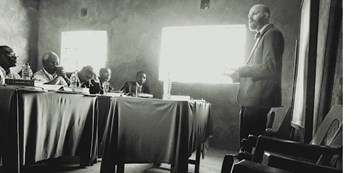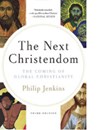Teddy James
AFA Journal staff writer
Above, an ICP pastor training class in Kenya.
August 2018 – “By 2025, Africa will be the most Christian continent on the face of the earth,” Ryan Bush, president of International Church Planters told AFA Journal.
“It’s not so much because Christianity is waning in the West,” he continued, “but it is because of the rapid spread of Christianity in the Global South. Right now, Christian churches, both in size and number, are growing in ways we cannot begin to imagine.”
Those statements may come as a surprise to Christians in America. Stories coming from the Global South – a missiological term referring to South America, sub-Saharan Africa, and parts of Asia – typically center on persecution of Christians, the rise of Islam, or extreme poverty.
But according to Bush, “There is a huge shift in the center of Christianity on planet Earth. The shift is happening because of the staggering amount of people calling themselves Christians in these parts of the world.”
A global vision
In many areas, the number of Christians is larger than the number of men equipped to be pastors. That is the driving force behind Bush’s vision for ICP.
“The places we operate have the gospel,” Bush said. “However, they need discipleship, training, and a theological foundation.”
To that end, Bush and his team developed the Didache Institute, an 18-month intensive training cycle for pastors that includes 12 courses, or modules, taught by ICP partners and personnel.
The 18 months are split into three-month segments. Every 90 days, ICP meets to teach two modules to men committed to the training program. Each module lasts 20 hours in the classroom. This equals 40 hours of classroom work per 90 days. The first two modules for pastors are “What is the Gospel?” and “The Role of the Pastor.” After one week of class is complete, the pastors-in-training are given a project to help them retain what they’ve learned and prepare for future classes.
“Most of our pastors are oral learners, which means they prefer a learning style very different from us,” Bush said. “They read, but not critically as most Westerners are taught to. They process and pass along information in concrete terms, parables, or real-life examples. So our projects have to reflect that reality.”
For the Old Testament Survey class, one of the second modules taught, students are tasked with memorizing a verbal script telling the big story of the Old Testament through a series of phrases and movements.
When discussing Egypt, students stand in a particular place. When Israel moves to the Promised Land in the story, students move to a new place.
Students are then tasked with presenting the memorized script to 10 different groups of people. In the next module, each man presents it one final time in front of his peers, who evaluate him.
A global structure
Almost as important as what is seen during ICP’s training, the unseen dividend is pastors receiving theologically sound doctrine.
“We consider ourselves scaffolding,” Bush said. “We’re not brick and mortar. We are not buying property. We are using what is already on the ground, leaving as small a footprint as possible.”
The intentional lack of permanence is for the spread of ICP’s model. “We want pastors to take what we do and duplicate it in the next village, and the village next to that,” Bush said.
But before graduates themselves can lead a Didache Institute to train pastors, they need more in-depth study. To that end, ICP selects the cream of the crop for such additional training. In the first class of 35 graduates, 5 stood out.
“We have great confidence in all 35, but we are taking these 5 through more intensive training,” Bush said. “We give them small opportunities to teach under our supervision. Our aim is to simply be the starting point and let these men take the model deeper into their locations.”
This also gives the pastors a chance to contextualize the model. Currently, ICP operates in two Kenyan locations, two Ecuadorian locations, and one location in Southeast Asia.
“Our end-game plan,” Bush said, “is for this to look less and less Western and more and more Kenyan, Ecuadorian, Asian, or wherever else it may be. These pastors know their cultures better than we ever could. We help them better understand the Bible and equip them to teach it.”
A global gospel
ICP clearly spends much of its energy on training pastors. But that is the first step of ICP’s ultimate goal.
“We train pastors because they are the shepherds of the flocks,” Bush said. “At the end of the day, we have to take a step back and realize we aren’t training the pastors for the pastors’ sakes. We are doing it for the health of the churches and wellbeing of the flocks.”
Because of the sound gospel teaching and universal model of ICP’s Didache Institute, invitations arrive from across the globe, asking ICP to come and train pastors.
“But whether we can accept those invitations or not comes down to bandwidth,” Bush explained. “In other words, how many do we have trained to train? How much funding do we have to send them?
“We are a nonprofit and therefore face the challenges of all nonprofits,” Bush said. “The greatest need we have is prayer. Pray for the pastors in training, pray for the teams teaching. In addition to prayer, we need people to give and to go. We need to fund future training, and we need pastors with teaching hearts to join us.”
Many Americans have begun feeling defeated by evidence of Christianity’s decline in the West. But the Christian faith is alive and growing at an incredible pace in the Global South. To get a peek at what God is doing in that region, Bush recommends The Next Christendom by Phillip Jenkins, a book detailing the spiritual awakening happening there. It could bring hope to the weakened Western church. 
 In photo, Ben Lane teaches Kenyan pastors.
In photo, Ben Lane teaches Kenyan pastors.
Witness By Ben Lane, Senior pastor at Coram Deo Church, Grande Prairie, Alberta, Canada.
Didache Institute takes its name from an early extrabiblical document regarding the teachings of the apostles.
I’ve had two experiences with International Church Planters. The first was to teach a class’s first module. On the second trip, I taught that class’s final module.
I got to see so much of their progress. They grew in their ability to understand and articulate the gospel from a biblical standpoint. They deepened their faith and understanding of God’s Word and led their churches to do so as well.
This is the closest thing these men will ever get to a seminary education, and it is a solid, theologically sound, biblically grounded education.
There is a brotherly affection between students and teachers in the Didache. We are united in our desire to know and understand Scripture.
I still keep in touch with some of the pastors. They routinely encourage me and tell me they are praying for my church and me. Their growth continues long after they graduate from the Didache Institute.
____________________
Resources
International Church Planters
intlchurchplanters.squarespace.com
501-362-3339
 The Next Christendom by Philip Jenkins
The Next Christendom by Philip Jenkins
is available at local and online booksellers.